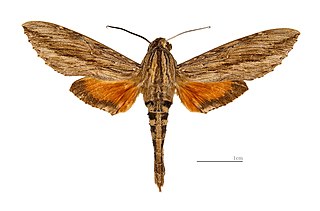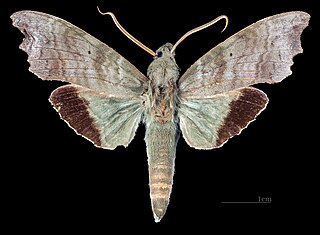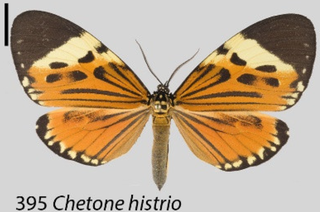
Erynnis is a genus in the skippers butterfly family Hesperiidae, known as the duskywings. Erynnis is found in the Neotropical realm and across the Palearctic, but the highest species diversity is in the Nearctic. The genus was erected by Franz von Paula Schrank in 1801.

The genus Satyrium contains butterflies in the family Lycaenidae. The species of this genus are found in the Holarctic ecozone. For distribution information see Further reading "Le genre Satyrium".

Chetone is a genus of tiger moths in the family Erebidae. The genus was erected by Jean Baptiste Boisduval in 1870.

Ithomiini is a butterfly tribe in the nymphalid subfamily Danainae. It is sometimes referred to as the tribe of clearwing butterflies or glasswing butterflies. Some authors consider the group to be a subfamily (Ithomiinae). These butterflies are exclusively Neotropical, found in humid forests from sea level to 3000 m, from Mexico to Argentina. There are around 370 species in some 40–45 genera.

Dilophonotini is a tribe of moths of the family Sphingidae described by Hermann Burmeister in 1878.

Aleuron is a genus of moths in the family Sphingidae first described by Jean Baptiste Boisduval in 1870.

Hippotion is a genus of sphinx moths. The genus was erected by Jacob Hübner in 1819.

Adelpha is a genus of brush-footed butterflies found from the southern United States and Mexico to South America. They are commonly known as sisters, due to the white markings on their wings, which resemble a nun's habit. This genus is sometimes included with the admiral butterflies (Limenitis).

Gonipterus is a genus of weevils in the family Curculionidae. There are approximately 20 described species in the genus, most of which are native to Australia. They are all plant feeders and many are specific to a single host species. Gonipterus gibberus and Gonipterus scutellatus infest a number of species of Eucalyptus and have spread to other parts of the world where these trees have been planted.

Chetone catilina is a moth of the family Erebidae. It was described by Pieter Cramer in 1775. It is found in French Guiana, Venezuela and Suriname.

Chetone histrio, or Boisduval's tiger, is a moth of the family Erebidae. It was described by Jean Baptiste Boisduval in 1870. It is found in Honduras, Guatemala and Peru.

Chetone ithomia is a moth of the family Erebidae. It was described by Jean Baptiste Boisduval in 1870. It is found in Nicaragua and Costa Rica.
Chetone phaeba is a moth of the family Erebidae. It was described by Jean Baptiste Boisduval in 1870. It is found in Guatemala.

Chetone salvini is a moth of the family Erebidae. It was described by Jean Baptiste Boisduval in 1870. It is found in Central America.
Chetone histriomorpha is a moth of the family Erebidae. It was described by Hering in 1925. It is found in Ecuador.












